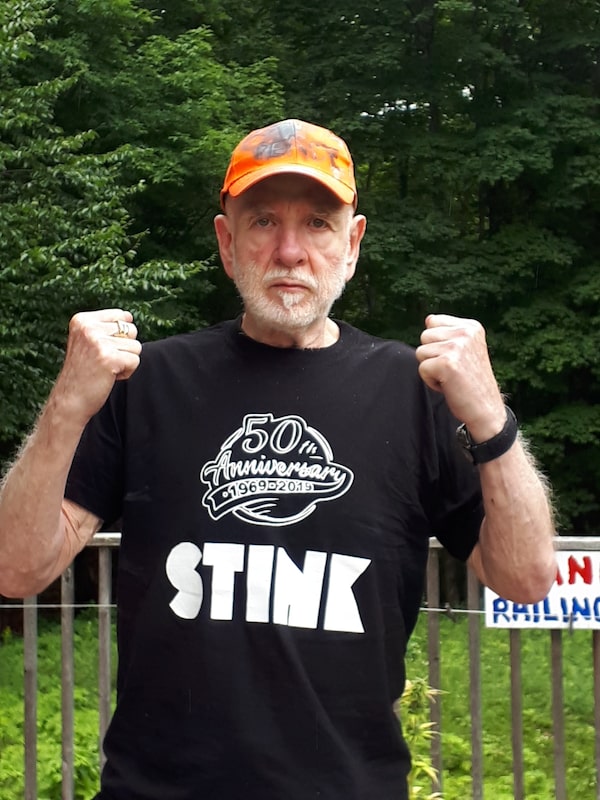
Mendelson Joe began painting in the mid-1970s, his art often politically motivated.Karen Robinson/Courtesy of Karen Robinson Gallery
Mendelson Joe is sick enough that he can no longer play the guitar. “I have two diseases that I don’t want to talk about,” he says. Asked if the illnesses were serious, he answers matter-of-factly. “Everything is serious when you’re going to die.”
A lifelong iconoclast now 76 years old, the artist-musician is being failed by everything except his wit and candidness. Mendelson Joe is still painting – he once received a $32,000 grant for his Liars series of satiric portraits, which included one of Brian Mulroney with a backside for a face – but medical issues with his hands have put an end to a music career that he was done with anyway. Or, more like, music was done with him.
“My last album was 2012′s Art Is the Healer, and no one covered it or reviewed it,” he says, speaking from his log cabin in Ontario’s Almaguin Highlands. “My music career, as far as I am concerned, is over, based on the fact that I am irrelevant.”
He began as the namesake co-founder of Toronto’s bell-bottomed blues-rockers McKenna Mendelson Mainline, who, in 1969, released the album Stink, which included the single Don’t Give Me No Goose for Christmas, Grandma. A year later the band released the single Think I’m Losing My Marbles. “If I had stayed in the band, I would have gone crazy,” he says.
He began painting in the mid-1970s, his art often politically motivated. As Globe and Mail art critic Gary Michael Dault once described Mendelson Joe, he paints what he loves and paints what he hates: “For me, M. Joe is a one-man passion-play, a powerful and often disturbingly decisive delineator of the human condition.”

Self-portrait by Mendelson Joe.Courtesy of the Artist
Mendelson Joe’s prolific solo music output, like his art, is outspoken. One of his last releases was the album Women Are the Only Hope, which was recorded in the 1990s but not released until 2012. The title song is a statement in the fragile, high-voiced, environmentally concerned style of Neil Young.
“I’ve made 30 albums over my career, and I’ve written at least 50 good songs,” he says. “Which isn’t bad.”
In a rambling interview, Mendelson Joe (born Joe Mendelson) spoke about the power of art, the value of a good pimp and the inevitably of death.
On the artist’s drive: “It’s not enough to have talent, you have to have the drive. It’s like the sex drive. And you have to be awake and paying attention to what’s going on around you in every way. I never thought about painting until I actually painted. I found some paint in the garbage in 1975. I stumbled into it. But I’m one of those people who are creative no matter what I’m stuck with. If you lock me up in a closet, I’d probably become a poet. It’s about having a perspective on existence.”
Leonard Cohen’s sorrow was the best sorrow: “Cohen’s Everybody Knows is the saddest song I know. It’s also the only thing he wrote that I liked. It’s a brilliant song about the sickness of humanity.”
Art as the healer: “When you see art or hear art, it lifts up the receiving party. And when I make art or make music, I get huge fulfilment. When I do it well, the payoff is the quality and the imagination I see or hear before me. It inspires me, and the inspiration is the healing part. When I go to an art gallery, I’m uplifted. When I listen to a record by Gwen Swick or Selina Martin, I just go nuts. It’s all about tickling your sense of life. Some people may listen to the rock groups Kiss or Rush. I don’t listen to them, but the point is that it’s in the eye or the ear of the beholder, whether you’re making this stuff or you’re receiving its delivery system.”
On the value of the bass guitar: “Bass playing is the most important instrument in contemporary popular music. If the bass is wrong, everything is wrong. If the bass is right, a piece of garbage can sound good. Our bass player on McKenna Mendelson Mainline’s Stink was Mike Harrison. It doesn’t get any better than him on Stink. He was a master, and I don’t say nice things about someone unless it’s true.”

Mendelson Joe's portrait of Bruce Cockburn.Courtesy of the Artist
Everybody needs a pimp: “The music business is a horrible business. I have an album on this, Everyone Needs A Pimp, from 2007, that says it all. Without a pimp, you don’t have anything. The pimp gets you played on the radio. Think of Bruce Cockburn. Without his manager, Bernie Finkelstein, where would he be? The important person in the music business is the pimp, and I don’t mean that pejoratively. When I was managed by Ray Danniels, who was Rush’s manager, he loved it that I called him my pimp. If you’re lucky enough to get heard, then the public buys your music. If the public buys your music, you get an opportunity to play in front of a lot of people. It’s usually the pimp that makes all that happen.”
On mortality: “Am I afraid of dying? I’ll say this: I drove a motorcycle for over 40 years, all year around, including winters. What does that tell you? I’ll let you figure it out.”
Sign up for The Globe’s arts and lifestyle newsletters for more news, columns and advice in your inbox.
 Brad Wheeler
Brad Wheeler